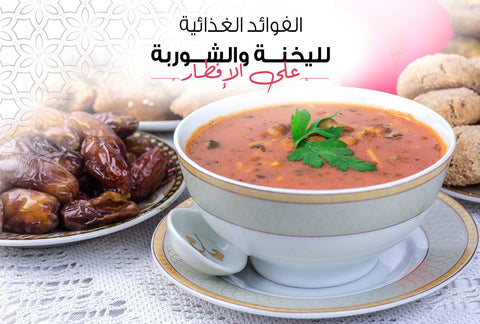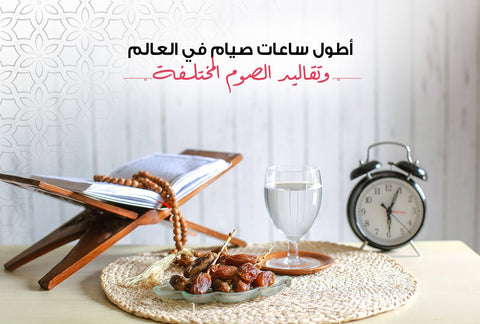The holy month of Ramadan has provided us with a golden opportunity to break our unhealthy eating patterns and fasting has given our tired digestive systems a much-needed break .
Eid al-Fitr brings together family and friends for three days, exchanging greetings, spending happy times, and enjoying delicious cakes and food .
It becomes unrealistic to talk about adhering to a strict diet in this festive atmosphere, when special and traditional foods and sweets are served, to which we have an emotional attachment for generations .
No expert is asking you to stress yourself out during the holiday; you just have to be moderate, not eat everything that is put in front of you, listen to your body, and try to be in harmony with it .
Nutrition experts advise following the Prophet's Sunnah and starting the day of Eid by drinking water and eating dates " to provide the body with fiber, natural sugar, potassium, and magnesium, and to boost the energy the body needs after fasting . " They also recommend adding almonds to the dates " to provide more protein ."
To help you transition safely from the dietary privacy of the month of fasting to normal days, and to turn Eid into a starting point towards a healthier lifestyle .
Some practical advice from experts
Break your fast wisely
Because your body has adapted to not eating for a long period of time, do not stress it too much with fatty foods suddenly, and advise “ moving from the Ramadan pattern to the regular pattern slowly, to avoid bloating and other digestive problems as the stomach shrinks due to fasting, and its capacity decreases.”
" It is better to return to eating 3 to 4 meals distributed throughout the day, and to limit fast and fatty meals that people often eat outside the home, as the body is more susceptible to indigestion and heartburn after the month of fasting . "
Moderation in eating
We emphasize the importance of moderation in eating " to maintain a healthy weight after the month of fasting, or to regain fitness if you gain weight ."
When meals are in smaller quantities, and spaced 3 to 4 hours apart, this " helps the digestive system get rid of any bacteria or waste ."
Food diversification
Experts stress the importance of diversifying your diet to obtain beneficial nutrients, and avoiding taking vitamins and supplements. It's also preferable to eat a variety of vegetables and meats, and you can shop for amazing meat offers from Meat & More .
“ Taking vitamins is unnecessary if people return to a healthy diet after Eid .”
Instead of indulging in fatty foods and sweets associated with the holiday, we recommend “ trying to eat more sources of fiber ” such as raw and juiced fruits and vegetables, cooked or souped vegetables, grains and beans, nuts , in addition to grilled fish and chicken.
Skinless, lean, unprocessed meats, eggs, unsweetened yogurt, and try to replace dates, dried figs, and dried fruits that were usually eaten during Ramadan because they are rich in iron, fiber, and antioxidants; with calorie-filled cakes to help the body
recover healthy
Drinking water is vital.
Drinking water is vital to prevent dehydration after a long period of fasting, especially for those who fast for approximately 17 hours a day. Therefore, it is important to ensure you drink enough water after Ramadan, as the body continues to lose water and salts through breathing, sweating, and urination .
Therefore, nutrition experts advise making sure to “ drink plenty of water, coconut water, lemon juice, or any natural juice, or other fluids that help hydrate the body and restore the fluids lost during the month of fasting.”
Don't stop fasting
Experts recommend continuing to fast regularly, once or twice a week, because it is healthy for the body, due to the physical and mental benefits it provides, such as improving memory, sleep, concentration, increasing energy, accelerating metabolism, and losing weight, as it allows the body to burn fat cells more efficiently.
Effectiveness of following a regular diet .
In addition to helping speed up the removal of waste left behind by dead and damaged cells from the body, scientists believe that the body's failure to regularly eliminate this excess waste leads to the development of chronic diseases, such as cancer, diabetes, and cardiovascular disease .
They also recommend repeating the fast because it helps in getting used to it and preparing the body for the upcoming Ramadan fast, without feeling a major change in the usual routine .
Return to exercise gradually.
Since most people tend to reduce exercise during Ramadan, you should take enough time to gradually return to your normal exercise level, and start with light exercises such as walking, yoga, or any type of cardio exercise , but without exhausting yourself , in order to preserve the energy reserve needed for recovery.
“The body, strengthening the muscles and regaining activity gradually after a month of stopping regular exercise, ” Farha recommended .
Proper nutrition after Ramadan and during Eid
It is important to gradually return to a normal diet after Ramadan, and not to overindulge in food in terms of quantity and quality. Learn about proper nutrition after Ramadan in the following :
During Ramadan, fasting people follow a diet that differs in timing and quality from other days for a whole month. Changing the diet after Ramadan may lead to stomach problems and other issues .
Therefore, it is recommended to continue following the healthy diet that was followed during the month of Ramadan, and gradually return to a healthy diet after Ramadan, and not to overeat in terms of quantity and quality .
Recommendations for healthy nutrition after Ramadan and during Eid
Here are some nutritional tips to help you return to a healthy diet after Ramadan and during Eid :
Change in main meal times
Try to eat your main meals during Eid around the times of Iftar and Suhoor, then gradually bring your meal times closer to your usual meal times. This will help you gradually return to your normal diet .
Have a light breakfast on Eid
Eating a heavy breakfast during Eid is a common mistake. To get your stomach used to food in the morning, you should start by eating small amounts of food and then gradually increase them .
Moderation in eating Eid sweets
During Eid al-Fitr, the focus is on eating a variety of foods, sweets, and nuts between meals, starting from the morning of the first day of Eid. This is despite the fact that the body has become accustomed to a full month of rest from food, which confuses the digestive system. Therefore, it is recommended to maintain consistent meal times .
eat small amounts
The basics of healthy nutrition after Ramadan include avoiding overeating, eating moderate amounts of food, and dividing meals into small portions .
Avoid fatty and fried foods.
Avoid overeating fatty and fried foods. It is recommended to choose cooked foods, such as eating cooked or boiled potatoes instead of fried ones .
Drink plenty of water
To get proper nutrition after Ramadan, you must be careful to drink plenty of water instead of juice and sweetened drinks that contain a high percentage of sugar .
Have a light dinner
If you are invited to dinner, do not go hungry. Instead, eat your meals regularly throughout the day so that you do not get hungry and have to eat large amounts of food at dinner .
Moderation in eating meat and rice
During Eid, families eat large quantities of meat with rice. This meal is eaten more than once a day, which increases the amount of meat consumed by an individual, greatly exceeding his needs. Therefore :
The body finds it difficult to digest this amount of meat, as the body actually only needs a limited amount of it and the rest is stored as fat .
The digestion of protein in these conditions produces large amounts of urea and uric acid, which affects kidney patients .
It raises blood cholesterol levels, so it is recommended to eat meat only once a day .
Moderation in eating oriental sweets
Eid sweets are a special part of Eid, especially various oriental sweets, such as: Kunafa and Qatayef, which contain a very high percentage of fats and sugars, and eating them in excess leads to the following :
Digestive system disturbance, which may lead to severe diarrhea accompanied by many other health risks .
Health risks are doubled for people with diabetes and obesity .
High blood lipids and heart and artery diseases, so it is preferable not to overdo it despite the pressures of hospitality and the insistence for which our society is famous .
practicing sports and physical activities
Some people find the Eid holiday an opportunity to overeat, rest and relax, which leads to feelings of laziness and lethargy, which in the long run leads to obesity and the many health risks that come with it .
Therefore, in continuation of the recommendations for healthy nutrition after Ramadan, it is necessary to practice some kind of sporting activity during the Eid holiday .
During Ramadan, fasting people follow a diet that differs in timing and quality from other days for a whole month. Changing the diet after Ramadan can lead to stomach and other problems .
Nutritional advice
Doctors and nutritionists recommend gradually returning to a normal diet; that is, avoiding overindulging in food in terms of quantity and quality .
Main meals: Eat main meals during Eid days close to the times of Iftar and Suhoor, then gradually bring meal times closer to your usual meal times. This will help gradually restore your normal diet .
Eid days
During Eid al-Fitr, the focus is on eating a variety of foods, sweets, and nuts between meals, starting from the morning of the first day of Eid. This ignores the fact that the body has become accustomed to a month-long rest from food, which confuses the digestive system. Therefore, it is recommended to maintain consistent mealtimes .
Drinking water
The study encourages eating small amounts of food, avoiding overeating, and avoiding excessive consumption of fatty and fried foods .
It is recommended to choose cooked foods, and be sure to drink plenty of water instead of juice and sweetened drinks that contain a high percentage of sugar .
oriental sweets
Eid sweets are a special part of Eid, especially various oriental sweets such as kunafa and qatayef, which contain very high levels of fat and sugar. Excessive consumption of these sweets can upset the digestive system, leading to severe diarrhea and numerous other health risks .
Health risks are compounded for those with diabetes, obesity, high blood lipids, and heart and arterial disease. Therefore, it's best not to overindulge in these sweets, despite the pressures of hospitality and the insistence that our society is known for. Instead, opt for a piece of fruit instead of these sweets or soft drinks .
Some people find the Eid holiday an opportunity to overeat, rest, and relax. This leaves them feeling lazy and sluggish, which in the long run leads to obesity and its many associated health risks. Therefore, it is essential to engage in some form of physical activity during the Eid holiday .
Happy Ramadan
Season's greetings
Consumer Awareness Department








Comments (0)
There are no comments for this article. Be the first one to leave a message!